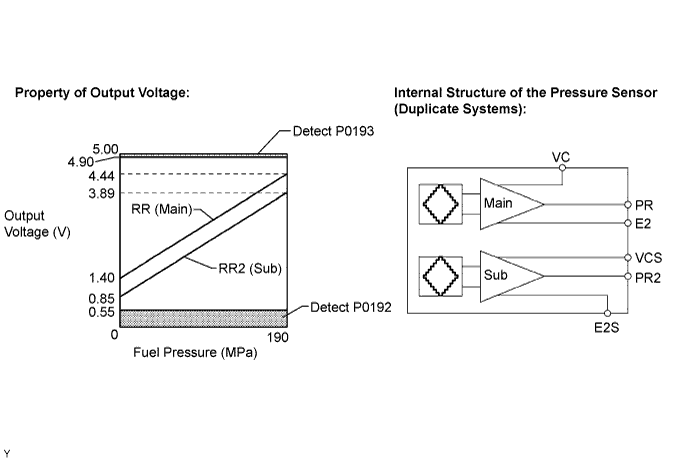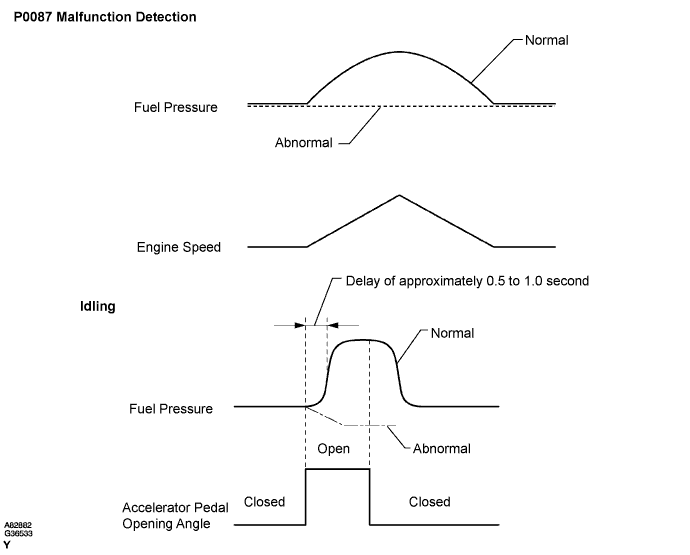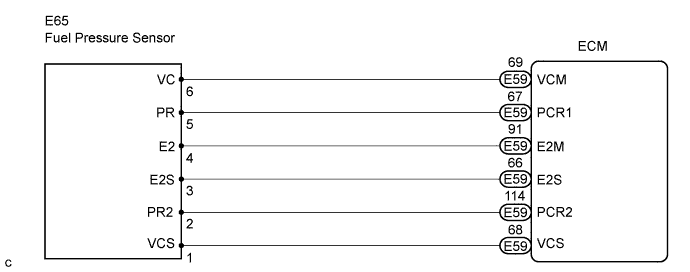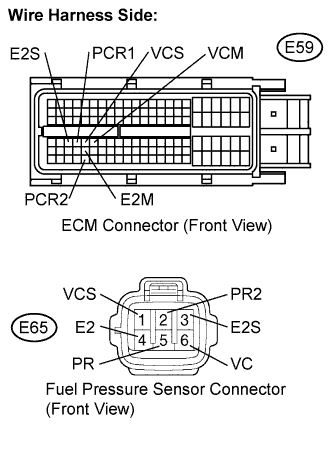Lexus IS250 IS220d GSE20 ALE20 2AD-FHV ENGINE CONTROL SYSTEM
TYPICAL MALFUNCTION THRESHOLDS
READ VALUE OF FUEL PRESSURE SENSOR
CHECK HARNESS AND CONNECTOR (FUEL PRESSURE SENSOR - ECM)
DTC P0087 Fuel Rail / System Pressure - Too Low
DTC P0190 Fuel Rail Pressure Sensor Circuit
DTC P0192 Fuel Rail Pressure Sensor Circuit Low Input
DTC P0193 Fuel Rail Pressure Sensor Circuit High Input
DESCRIPTION
The ECM monitors the internal fuel pressure of the common rail using the fuel pressure sensor, and controls the suction control valve to regulate the internal pressure to the target pressure. The pressure sensor is a semiconductor that varies electrical resistance when pressure is applied to its silicon chip. This sensor outputs the voltage in proportion to the internal fuel pressure.

| DTC No. | DTC Detection Condition | Trouble Area |
| P0087 | Fuel pressure sensor output voltage stays at fixed value (1 trip detection logic) |
Open or short in fuel pressure sensor circuit Fuel pressure sensor ECM |
| P0190 | Fuel pressure sensor output voltage is 0.55 V or less, or 4.9 V or more for 0.5 seconds (1 trip detection logic) |
Open or short in fuel pressure sensor circuit Fuel pressure sensor ECM |
| P0192 | Fuel pressure sensor output voltage is 0.55 V or less for 0.5 seconds (1 trip detection logic) |
Open or short in fuel pressure sensor circuit Fuel pressure sensor ECM |
| P0193 | Fuel pressure sensor output voltage is 4.9 V or more for 0.5 seconds (1 trip detection logic) |
Open or short in fuel pressure sensor circuit Fuel pressure sensor ECM |
- HINT:
| Engine Speed | Fuel Pressure |
| Idling | Approximately 37 to 43 MPa |
| 3,000 rpm (No engine load) | Approximately 60 to 66 MPa |
MONITOR DESCRIPTION
Under normal conditions, the internal fuel pressure of the common rail usually fluctuates 1 to 2 MPa (10 to 20 kgf/cm2, 145 to 290 psi) even when the driving conditions are constant. The internal fuel pressure is approximately 37 to 43 MPa (377 to 439 kgf/cm2, 5,365 to 6,235 psi) when idling, and it increases to approximately 60 to 66 MPa (612 to 673 kgf/cm2, 8,700 to 9,570 psi) when running the engine at 3,000 rpm. This DTC is set if there is no fluctuation of the fuel pressure.
If this DTC is set, the ECM enters fail-safe mode and limits engine power. The fail-safe mode continues until the engine switch is turned off.

These DTCs are set if the fuel pressure sensor output voltage is out of the standard range and an open or short malfunction of the sensor circuit has occurred.
If these DTCs are set, the ECM enters fail-safe mode and limits the engine power. The fail-safe mode continues until the engine switch is turned off.
MONITOR STRATEGY
| Required Sensors | Fuel pressure sensor |
| Frequency of operation | Continuous |
| Duration | 1 second |
| MIL operation | 1 driving cycle |
| Required Sensors | Fuel pressure sensor |
| Frequency of operation | Continuous |
| Duration | 0.5 seconds |
| MIL operation | 1 driving cycle |
| Required Sensors | Fuel pressure sensor |
| Frequency of operation | Continuous |
| Duration | 0.5 seconds |
| MIL operation | 1 driving cycle |
| Required Sensors | Fuel pressure sensor |
| Frequency of operation | Continuous |
| Duration | 0.5 seconds |
| MIL operation | 1 driving cycle |
TYPICAL ENABLING CONDITIONS
| Item | Specification | Specification |
| Minimum | Maximum | |
| Engine speed | 500 rpm | - |
| Battery voltage | 8 V | - |
| Fuel volume | 5 mm3 | - |
| The monitor will not run if the fuel pressure sensor circuit (P0190, P0192 and P0193) is malfunctioning. | ||
TYPICAL MALFUNCTION THRESHOLDS
| Detection Criteria | Threshold |
| Changing value of fuel pressure | Virtually no fluctuation |
| Detection Criteria | Threshold |
| Fuel pressure sensor output voltage | Less than 0.55 V or more than 4.9 V |
| Detection Criteria | Threshold |
| Fuel pressure sensor output voltage | Less than 0.55 V |
| Detection Criteria | Threshold |
| Fuel pressure sensor output voltage | More than 4.9 V |
WIRING DIAGRAM

INSPECTION PROCEDURE
- NOTICE:
- After replacing the ECM, the new ECM needs registration and initialization .
- HINT:
| 1.READ VALUE OF FUEL PRESSURE SENSOR |
Connect the intelligent tester to the DLC3.
Start the engine and turn the intelligent tester ON.
Enter the following menus: Powertrain / Engine / Data List / Fuel Press.
Read the values.
- OK:
- The internal fuel pressure of the common rail is within the specification below.
| Engine Speed | Fuel Pressure |
| Idling | Approximately 37 to 43 MPa |
| 3,000 rpm (No engine load) | Approximately 60 to 66 MPa |
|
| ||||
| OK | |
| 2.CHECK IF DTC OUTPUT RECURS |
Connect the intelligent tester to the DLC3.
Turn the engine switch ON (IG) and turn the intelligent tester ON.
Enter the following menus: Powertrain / Engine / DTC / Clear.
Clear the DTC(s).
Let the engine idle for 60 seconds, and then repeat quick engine RPM accelerations (to 2,500 rpm) for 30 seconds.
Enter the following menus: Powertrain / Engine / DTC.
Read the DTC(s).
- Result:
Display (DTC Output) Proceed to P0087, P0190, P0192 or P0193 A No output B
|
| ||||
| A | ||
| ||
| 3.CHECK HARNESS AND CONNECTOR (FUEL PRESSURE SENSOR - ECM) |

Disconnect the E59 ECM connector.
Disconnect the E65 fuel pressure sensor connector.
Check the resistance between the wire harness side connectors.
- Standard resistance (Check for open):
Tester Connection Specified Condition PCR1 (E59-67) - PR (E65-5) Below 1 Ω PCR2 (E59-114) - PR2 (E65-2) Below 1 Ω VCS (E59-68) - VCS (E65-1) Below 1 Ω VCM (E59-69) - VC (E65-6) Below 1 Ω E2M (E59-91) - E2 (E65-4) Below 1 Ω E2S (E59-66) - E2S (E65-3) Below 1 Ω
- Standard resistance (Check for short):
Tester Connection Specified Condition PCR1 (E59-67) or PR (E65-5) - Body ground 10 kΩ or higher PCR2 (E59-114) or PR2 (E65-2) - Body ground 10 kΩ or higher VCS (E59-68) or VCS (E65-1) - Body ground 10 kΩ or higher VCM (E59-69) or VC (E65-6) - Body ground 10 kΩ or higher E2M (E59-91) or E2 (E65-4) - Body ground 10 kΩ or higher E2S (E59-66) or E2S (E65-3) - Body ground 10 kΩ or higher
Reconnect the ECM connector.
Reconnect the fuel pressure sensor connector.
|
| ||||
| OK | ||
| ||